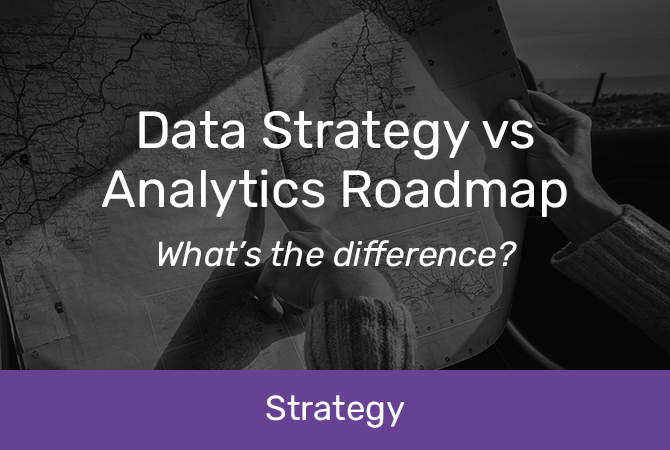
Data Strategy vs. Analytics Roadmap: What's the difference?
When creating a plan of analytics attack, you’re likely to encounter the terms ‘data strategy’ and ‘analytics roadmap’. Often (mistakenly) used interchangeably, strategies and roadmaps are not the same - but they are connected. Read on to find out how.
 what's a data strategy?
what's a data strategy?
An initial and high-level look at an organisation’s objectives for investing in analytics, a data strategy helps businesses get an understanding of how to leverage data and what sorts of opportunities it could provide. At a more granular level, there are a number of components that are important to include in a data strategy, including the following:
- Opportunities that can be enabled by data and analytics
- Data content (what data do you have already?)
- Quality and performance (how good is it?)
- Roles and responsibilities, ownership (who is going to handle what?)
- Data migration and integration (will the data live in a CDP?)
- Security, privacy and licencing
- Organisational capability model and evolution
- Internal communication of the strategy
These factors cumulatively give organisations a picture of what they want out of an investment in analytics. Many of these desired outcomes tend to be similar across all manner of industries and company sizes which makes sense, because businesses typically want the same thing: to learn why things are happening and determine how to optimise those things in order to increase revenue.
Data strategies usually get endorsed at a high level - few senior management teams are going to say, ‘No thanks, we don’t want to optimise operations and increase revenue.’ The difficulty comes when you want to actually make a change in your organisation based on the strategic direction you’ve determined. That’s when you need an analytics roadmap.
 What's an analytics roadmap?
What's an analytics roadmap?
An analytics roadmap is designed to translate the data strategy’s intent into a plan of action - something that outlines how to implement the strategy’s key initiatives. Creating this kind of framework allows you to evaluate the potential value of each strategic initiative (as well as what the constraints would be) so you don’t end up squandering time and resource on the wrong projects.
At a very practical level, the roadmap considers all of the different everyday activities that will need to occur in order to bring the data strategy to fruition, as well as the key milestones and dependencies you’ll need to keep in mind. To give an example, your data strategy might say ‘We want to build internal capability.’ You have a goal, but you haven’t outlined how you’re going to get from here to there. Your analytics roadmap would then determine what skills you need, what kinds of people you want to hire, what the timeframe is etc. You’re breaking down goals into actionable bite-sized activities.
One of the most important components of an analytics roadmap is determining the phasing of these various activities. Rather than arbitrarily choosing a project to start on, you have to outline what needs to happen at what stage of the process in order to facilitate other activities down the road.
 How do I create a data strategy and analytics roadmap?
How do I create a data strategy and analytics roadmap?
There are many steps involved in creating a data strategy, but it is something that organisations can do themselves. Click to download Datamine’s free guide on creating data strategies in order to learn more about them and begin the process yourself.
If you’ve already created a data strategy and are still not seeing true value from analytics, you should look into creating an analytics roadmap to accelerate your progress with the guidance of a third party expert. Getting external advice on a roadmap is useful for two main reasons:
1. You get fresh eyes on what you’re doing, and hopefully a more objective opinion about whether current practices can actually be transferred to new ones2. You get access to significantly more expertise from previous transformations, in your industry or another
Datamine has decades of collective experience in helping organisations determine their strategic direction and what steps they need to take to get there. Get in-touch to discuss how we can work together on your business strategy today.
Download our Datamine Guide to Data Strategies
This guide highlights that data strategy is key to your organisation's ability to unlocking and capitalising on the asset that is your data. The guide explains the importance of data management, the typical issues those involved in data management may experience, and how to address them. It also describes practical ways your company can begin to put its strategy into action.















































